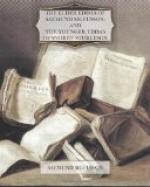HODUR THE BLIND, ASSASSIN OF BALDUR
29. “Among the AEsir,” continued Har, “we also reckon Hodur, who is blind, but extremely strong. Both gods and men would be very glad if they never had occasion to pronounce his name, for they will long have cause to remember the deed perpetrated by his hand.[132]
30. “Another god is Vidar, surnamed the Silent, who wears very thick shoes. He is almost as strong as Thor himself, and the gods place great reliance on him in all critical conjunctures.
31. “Vali, another god, is the son of Odin and Rinda, he is bold in war, and an excellent archer.
32. “Another is called Ullur, who is the son of Sif, and stepson of Thor. He is so well skilled in the use of the bow, and can go so fast on his snow-skates, that in these arts no one can contend with him. He is also very handsome in his person, and possesses every quality of a warrior, wherefore it is befitting to invoke him in single combats.
33. “The name of another god is Forseti, who is the son of Baldur and Nanna, the daughter of Nef. He possesses the heavenly mansion called Glitnir, and all disputants at law who bring their cases before him go away perfectly reconciled.
“His tribunal is the best that is to be found among gods or men.
OF LOKI AND HIS PROGENY.
34. “There is another deity,” continued Har, “reckoned in the number of the AEsir, whom some call the caluminator of the gods, the contriver of all fraud and mischief, and the disgrace of gods and men. His name is Loki or Loptur. He is the son of the giant Farbauti. His mother is Laufey or Nal; his brothers are Byleist and Helblindi. Loki is handsome and well made, but of a very fickle mood, and most evil disposition. He surpasses all beings in those arts called Cunning and Perfidy. Many a time has he exposed the gods to very great perils, and often extricated them again by his artifices. His wife is called Siguna, and their son Nari.
35. “Loki,” continued Har, “has likewise had three children by Angurbodi, a giantess of Jotunheim. The first is the wolf Fenrir; the second Jormungand, the Midgard serpent; the third Hela (Death). The gods were not long ignorant that these monsters continued to be bred up in Jotunheim, and, having had recourse to divination, became aware of all the evils they would have to suffer from them; their being sprung from such a mother was a bad presage, and from such a sire was still worse. All-father therefore deemed it advisable to send one of the gods to bring them to him. When they came he threw the serpent into that deep ocean by which the earth is engirdled. But the monster has grown to such an enormous size that, holding his tail in his mouth, he encircles the whole earth. Hela he cast into Nifelheim, and gave her power over nine worlds (regions), into which she distributes those who are sent to her,




